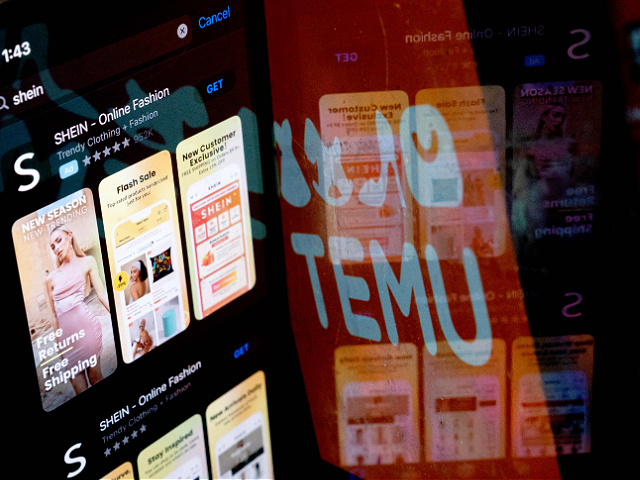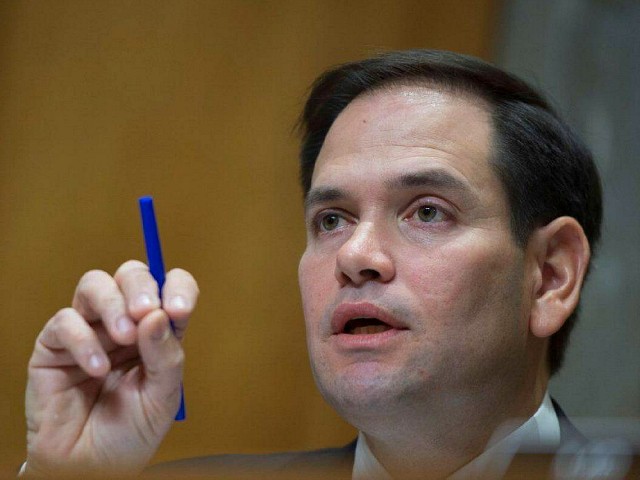Sen. Marco Rubio (R-FL) sent a letter on Thursday to Gary Gensler, the commissioner of the U.S. Securities and Exchange Commission (SEC), in response to news reports that Shein, a Chinese online retailer that sells women’s clothing at steep discounts, is seeking an initial public offering (IPO) on the U.S. stock market, warning that the company is “subject to the whim” of Beijing and thus a threat to investors.
“Investors deserve to know the truth about SHEIN. As a China-based issuer, SHEIN is subject to enhanced disclosure requirements and review by the SEC,” Sen. Rubio wrote in the letter. He continued:
As you consider SHEIN’s registration statement and related documents, I ask that you require SHEIN to make additional disclosures about its operations, ties to the PRC [People’s Republic of China] and CCP [Chinese Communist Party], and the serious risks of doing business in the PRC.
Shein became the world’s largest online-only fashion vendor in 2022, raking in $100 billion in sales that year, and has only grown in influence – and profitability – since then. As of 2023, the company is responsible for the most “fast fashion,” or cheap mass-produced clothing, purchases in America. It markets heavily to younger American women, maintaining a large presence on social media sites such as Instagram and pursuing “native” advertising by inviting Instagram and TikTok “influencers” to tour its Chinese facilities and generate positive content about the company.
The company has dwarfed its competition, extensive evidence suggests, through a combination of intellectual property theft, slave labor, and abuse of American shipping regulation loopholes – all made possible thanks to collaboration with the Communist Party.
Reports surfaced in November that Shein had “confidentially” filed for an IPO with the SEC. The process to obtain an IPO is lengthy and, reportedly, ongoing. In January, as the process continued, anonymous sources told Reuters that Shein had, in addition to seeking SEC approval, formally requested permission from the Chinese Communist Party to request the IPO in America. Shein has attempted to present itself as headquartered in Singapore and possessing a “global” identity, attempts undermined by the reports that the company still required permission from Beijing to engage in major international business operations.
“News reports indicate that SHEIN approached regulators in the People’s Republic of China (PRC) to gain approval of its IPO,” Rubio wrote in his letter to the SEC chief, adding, “This revelation makes virtually certain that the Chinese government will censor SHEIN’s filing documents to hide pertinent information from U.S. regulators and investors about the extent and nature of its operations in the PRC, as well as the risks of doing business in the PRC.”
Rubio wrote that the SEC should “require extraordinary disclosures from SHEIN regarding its structure, interactions with the Chinese government and Chinese Communist Party (CCP),” given its evidently close relationship to the regime.
“SHEIN’s operations in the PRC mean it is subject to the whim of the Chinese government, and by extension the Chinese Communist Party (CCP). In short, SHEIN is not a ‘global’ company. It is a China-based company,” the senator wrote, continuing:
If there was any doubt that SHEIN is a China-based company, recent news articles reveal the company approached the China Securities Regulatory Commission (CSRC) and Cyberspace Administration of China (CAC) to approve its IPO in the United States. These Chinese regulators reportedly are holding discussions with the company’s senior executives about the IPO. They are also investigating SHEIN’s data-security practices to prevent information about the company’s employees, suppliers, and contract manufacturers from leaking outside of the PRC.
“SHEIN’s collaboration with Chinese regulators raises serious doubts that its IPO filings are complete and accurate,” Rubio wrote. “As I have written to you in the past, those very regulators order Chinese companies to deceive U.S. authorities and investors about the risks of doing business in the PRC.”
The letter concluded with recommendations as to what information the SEC should demand from Shein for an IPO, including “acknowledgement that a majority of SHEIN’s operations are in the PRC,” recognition of the evidence that Shein has sold products likely to have been tainted by slavery and that it has stolen the intellectual property of artists.
China is currently waging a genocide against the indigenous people of occupied East Turkistan, a territory it administers as the “Xinjiang Uyghur Autonomous Region.” Part of that genocide has involved imprisoning millions of people in concentration camps and shipping many of them out to factories, farms, and other facilities to be used as slaves. China claims the concentration camps are “vocational and education training” centers and the slaves shipped off to toil for regime-linked enterprises are “graduates” of the centers.
Many of the imprisoned Uyghurs and members of other local communities in East Turkistan work picking cotton. East Turkistan is responsible for the production of about 84 percent of cotton from China, representing a fifth of the global market share.
In 2020, the Coalition to End Forced Labour in the Uyghur Region, a group of nearly 200 human rights and labor organizations, revealed that the prevalence of “Xinjiang cotton” in the fashion market meant that “almost every major apparel brand and retailer selling cotton products is potentially implicated” in Chinese regime-orchestrated slavery.
“Right now, there is near certainty that any brand sourcing apparel, textiles, yarn or cotton from the Uyghur Region is profiting from human rights violations, including forced labour, both in the Uyghur Region and more broadly throughout China,” the Coalition’s report declaimed.
In 2022, Bloomberg News revealed that laboratory testing of Shein products found Xinjiang cotton in the company’s clothing. Shein denies that it benefits from slavery in any way. A report published by the House Select Committee on the Chinese Communist Party in June concluded there was an “extremely high risk” that products sold by Shein and another Chinese e-commerce platform, Temu, were selling slavery-tainted products to Americans.

This photo illustration shows the Shein app on the App Store reflected in the Temu logo, in Washington, DC, on February 23, 2023 (STEFANI REYNOLDS/AFP via Getty Images).
The Uyghur Forced Labor Prevention Act (UFLPA), which went into effect in June 2022, bans companies from importing products from East Turkistan into America unless they can prove that the products were not tainted by slave labor. The law only applies to shipments worth $800 or more, an exception known as de minimis. The average Shein package, as of April 2023, was worth only $11, and unlikely to be shipped from East Turkistan to America even if manufactured by Uyghur slaves or with Xinjiang cotton.
Rubio, who introduced the UFLPA, also introduced legislation in the Senate to end the de minimis loophole.
“Congress needs to pass my bipartisan Import Security and Fairness Act to close this loophole entirely for Chinese imports,” Rubio told Breitbart News this week. “Every day we wait, millions more packages from Communist China flood into our country, endangering American customers and undermining American businesses.”
Shein is also facing a racketeering lawsuit by artists who say the company stole their designs and manufactured clothing with them, depriving the original creators of their profits.
“Shein has grown rich by committing individual infringements over and over again, as part of a long and continuous pattern of racketeering, which shows no sign of abating,” attorneys for the plaintiffs said in July. “It is not an exaggeration to suggest that Shein’s pattern of misconduct involves commission of new copyright and trademark infringements every day.”


COMMENTS
Please let us know if you're having issues with commenting.